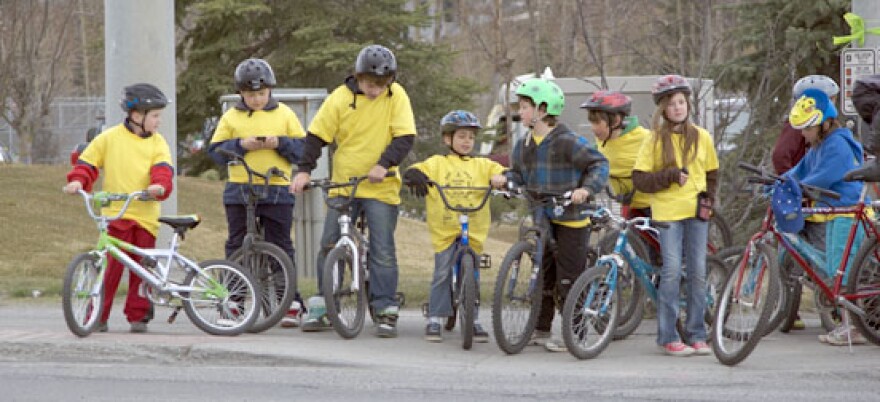When public schools closed in March, it left many families scrambling for child care.
But child care facilities had to deal with pandemic risks, too. Though Alaska designated those facilities essential and said they could stay open when other businesses had to close, some ended up closing their doors anyway, for various reasons.
The Soldotna Kids Early Learning Center on the Kenai Spur Highway chose not to close its doors. Instead, the center dropped its capacity limit to about 25 percent and amped up its cleaning with the six staff members who stayed on. They started asking parents to stay out of the classrooms early on and only allow one parent at a time on site. Kids’ things are kept in separate boxes, which makes cleaning easier, and the staff explains in simple terms that they’re doing their best to keep everyone safe. Dawn Yoder, with the center, says the kids are getting it, and they’ve gone back up to having full capacity of 90 kids.
"They’re doing great," she said. "They’re leaving their toys at home, they’re leaving their extra blankets at home, because they don’t want to bring their germs in, either. So they’ve been really helpful."
While the kids are adapting to the pandemic world, the center is doing its best to stay afloat financially. Social distancing means fewer kids in rooms and way more cleaning work. Yoder said they haven’t struggled for supplies but keeping up with the cleaning each day is definitely more time.
Laurie Mead, who operates Kyrie N’ Friends child care off K-Beach Road, said she used to disinfect twice a day. These days, she has to disinfect after every time a child uses a highchair.
Like the Soldotna Kids Early Learning Center, Mead said she no longer allows parents into her facility, and she checks temperatures as children are dropped off as she receives them one at a time. With a capacity of 12 children, she said she is full and has a waiting list. Some parents pulled their children out when the pandemic began but she said her phone has been ringing since.
Both centers said they're frustrated by the promise of aid from the state. The Alaska Child Care Program Office announced in March that coronavirus aid would be available to child care providers in several installments. However, way more applied for it than the office anticipated, leading to a shortfall in available funding.
Mead said this approach let providers down.
"When we got the original email, it was like, ‘Hallelujah — I am going to to survive, I am going to be able to do what I need to do for my childcare facility and for my families,’" she said. "And then we got the news that there was only going to be one payment to us, which was smaller than what they told us it would be. And so it’s just more stress and trying to figure out how to work it out, and then we got an email last week saying we’d be getting a little more funding, but it’s not even close to what they originally said it would be."
Yoder said the Soldotna center ended up receiving about 20 percent of what they originally thought they would. Because they thought they knew it was coming, they offered forward credit to families and kept staff paid, so she said it hurt when the money didn’t materialize.
The state announced another $10.5 million in aid available for child care centers last week. Stephanie Berglund is the executive director of thread, a statewide advocacy organization for child care. Berglund estimates it will take about $10 million a month to keep child care in the state afloat.
"It is extremely expensive to operate childcare," she said. "Already, they’re operating on thin margins, and we know through COVID, especially serving half of the children they would typically have in care, that they are incurring more business expenses while also seeing an almost 50 percent reduction or more to their income, tuition and revenue."
Thread is advocating for municipalities to set up dedicated funds using their federal relief money to support child care. Juneau has already committed $1 million to child care. Berglund said child care is critical to a functioning economy — parents, even those working from home, need qualified people to watch their children if they want to work.
"I think you could ask any parent who’s working from home with their young children right now, and they’re under extreme stress," she said. "We have a lot of empathy for them right now. It is not a long-term solution for us to be expecting our families to be working from home and caring for their young children."
Looking forward, there’s still some question of what will happen if schools don’t reopen. Mead said she has several school-age children who may not go back if schools don’t open in the fall, meaning she won’t be able to take in more kids who are too young for school. Yoder said the Soldotna Kids Early Learning Center is working on a grant right now to get a certified teacher for kids age 5 to 13 so, if school is online again in the fall, kids can have a certified teacher to help them.
Click here for thread’s online resources for families looking for child care.
Reach Elizabeth Earl at eearl@kdll.org.



